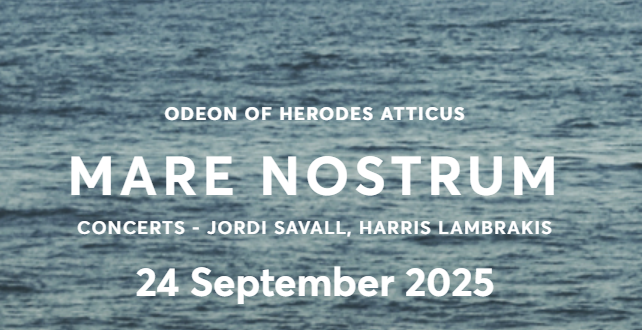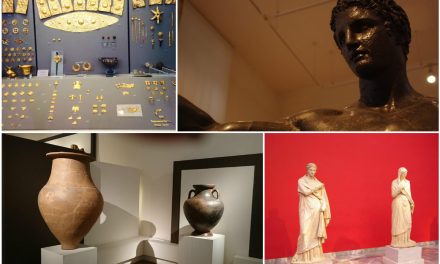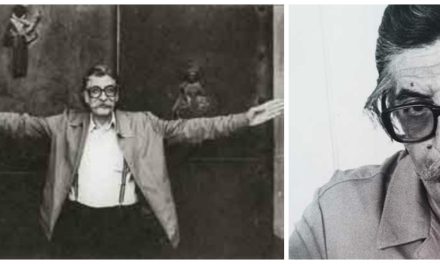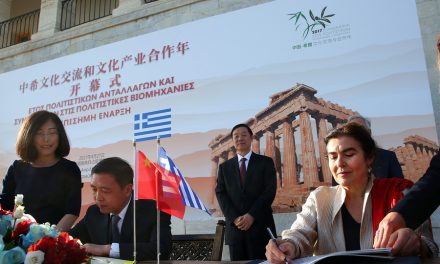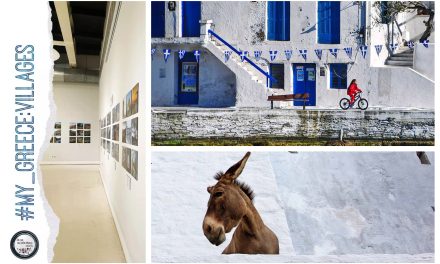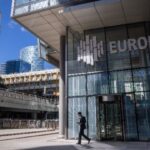On September 24, 2025, at 21:00, the historic Οdeon of Herodes Atticus in Athens will host a unique and concert: Mare Nostrum. This production by the Greek National Opera (GNO) Learning & Participation Department brings together the internationally celebrated Catalan conductor and viola da gamba virtuoso, Jordi Savall, along with his esteemed ensemble Hespèrion XXI, in conversation with the GNO Intercultural Orchestra. This special musical evening, illuminates the rich musical exchanges that have shaped the Mediterranean’s cultural landscape.
The Vision of a Shared Sea
The concert’s title, Mare Nostrum (Our Sea), sets the profound tone for the evening. The intent is to portray the Mediterranean not as a divider, but as a shared sea—one that unites the peoples who each rightfully consider it their own. In a contemporary era requiring heightened understanding, this musical affirmation asserts that genuine progress can only be achieved through sharing and the realization that the ties that unite us surpass those that separate us.
Jordi Savall himself emphasizes that the necessity goes beyond mere cultural or religious discussion: “It is not enough to have a dialogue between cultures and religions—we need a dialogue between souls. And that is exactly the kind of dialogue this concert’s music offers,” he notes.

The resulting program is a powerful journey through diverse cultural expressions, drawing on melodies from Christian, Sephardic, Ottoman, and Arab-Andalusian traditions. The repertoire, conducted and curated by Savall in collaboration with Harris Lambrakis, promises a broad spectrum of sound, encompassing traditional Greek, Cypriot, Turkish, and Arabic music, alongside contemporary repertoire and ancient music dating back to the 1700s. During rehearsals, the orchestra was observed trying melodies from “Γιασεμί” and “Wa Habibi”. This musical collaboration, occurring during a “highly critical historical period,” is poised to highlight music’s power as a universal language, promoting peaceful co-existence and reconciliation.
The concert will feature two exceptional vocalists: Katerina Papadopoulou and the acclaimed French singer Marc Mauillon.
The Maestro and His Legacy
Jordi Savall is recognized as one of the most prominent performers globally, renowned for his dedication to preserving and promoting the Mediterranean musical tradition. Savall began his career focused on the viola da gamba, an instrument that acts as a symbol of Renaissance and Baroque music. Over fifty years, he has devoted his life to reviving and spreading forgotten music spanning the Mediterranean, the East, and Europe.

His approach skillfully combines strict musical precision with a deep humanitarian perspective, allowing him to explore the past with both liveliness and timelessness. Savall’s diverse roles include being a gambist, maestro, musicologist, researcher, and an ambassador for cultural reconciliation. His commitment to cultural understanding has garnered him numerous international distinctions, including the respected title of “Artist for Peace” from UNESCO. In Athens, Savall will also perform as a musician, playing the vielle alongside Hespèrion XXI members Guillermo Pérez (organetto), Efrén López (medieval lute, hurdy-gurdy), and Dimitri Psonis (santouri, percussion, bells).
A Collaboration Built on Sharing
The concert gains its unique resonance from the collaboration between Savall’s Hespèrion XXI and the GNO Intercultural Orchestra. The GNO Intercultural Orchestra, led by Harris Lambrakis, is an ensemble known for its extensive repertoire that encompasses traditional, modern, and experimental music.

The orchestra celebrates its seventh anniversary of continuous evolution and creative presence, having sought out new collaborations consistently. Lambrakis has been at the helm since its founding in 2018. Lambrakis notes that the orchestra’s “compass” over these seven years has been the concept of “sharing” (μοίρασμα): sharing ideas, musical genres, and culture.
The ensemble truly embodies interculturality, comprising musicians from highly diverse backgrounds and cultural identities. Throughout its history, the orchestra has included participants from Greece, Cyprus, Egypt, Turkey, Syria, Iraq, Iran, Argentina, Congo, England, and France. Lambrakis explains that each musician adds something distinctive to the identity of both the collective and the individuals involved, noting: “For me, that is interesting, to approach the culture of the person next to you and for them to approach yours. To make this sharing happen. And not only in terms of traditional instruments, but with the personality of each person,” as some compose in a classical style, others in a more traditional style, and others focus on electronic music.
The conductor views the deepest achievement of the orchestra as the “sharing of life” among its members, fostering a bond that transcends their weekly three-hour rehearsals.
For Harris Lambrakis, the partnership with Savall is a profound honor. He states that there could not have been a better collaboration for the concert at the Odeon of Herodes Atticus than with the emblematic maestro and musician Jordi Savall, who accepted their invitation. Lambrakis acknowledges Savall as a globally renowned landmark in early music whose performances, approach, and style have influenced the entire world. Furthermore, Savall embodies interculturality by bringing diverse cultures together, seeking synergies, and experimenting with the sound of old instruments combined with new timbres—a combination upon which this specific partnership will be based.
This collaboration reaffirms the Greek National Opera‘s steadfast commitment to promoting intercultural dialogue and showcasing contemporary musical creation through events that unite diverse traditions and people via the shared language of art.
I.L. with information from ANA-MPA, Greek National Opera, all photos from Greek National Opera.


